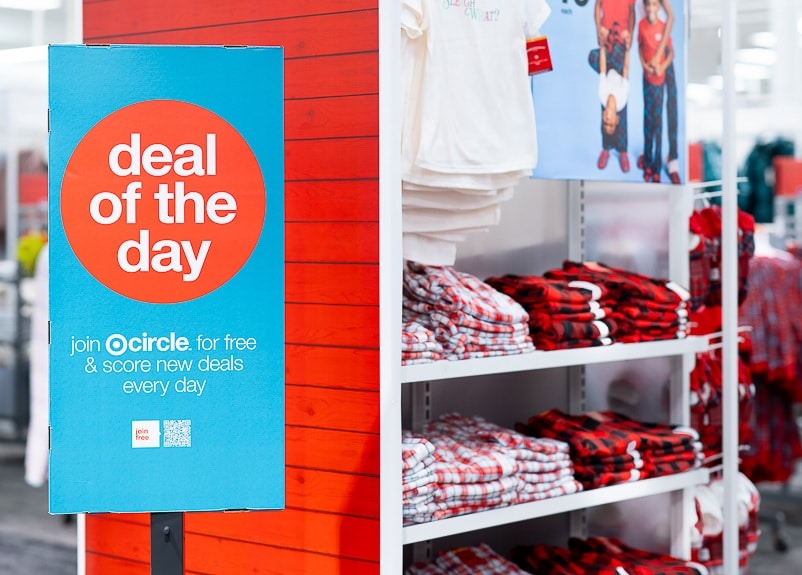
With the holiday shopping season getting underway in earnest, even the cost-conscious may end up splurging on some gifts. But when it comes to everyday necessities for themselves and their families – no coupons and no deals could be a no-go.
Two of the country’s largest retailers have confirmed that shoppers are buckling down, looking for savings and refusing to pay full price. And increasingly, those retailers are responding with more promotions and price cuts.
This year, both Walmart and Target have reduced prices on thousands of items. And heading into the last month of the year, they say they’re now reducing prices on thousands more.
During the just-completed third quarter of its fiscal year, Walmart “had price rollbacks on approximately 6,000 items across our assortment, including around 3,000 items in grocery,” Walmart Chief Financial Officer John David Rainey told investors last week. The retailer has now “converted nearly 2,000 price rollbacks over the past year to long-term price reductions,” he went on. “Clearly, our customers are finding value in what they’re finding at Walmart.”
Target is looking to extend its own recent price cuts as well. “After an incredible response to our price reductions on 5,000 everyday items earlier this year,” Target CEO Brian Cornell told investors last week, “we reduced prices on an additional 2,000 items to drive traffic and help celebrate the holidays.”
But while Walmart focuses on everyday low prices, Target is also emphasizing its weekly sales and deals. “We’re seeing a stronger response to promotions than we’ve seen in some time,” Cornell said. “Consumers are looking for value. They are looking for promos and deals when they’re shopping for those everyday essentials. And they’re shopping carefully.”
“We saw consumers lean into everyday essential stock-up promotions throughout the quarter to further stretch their monthly budgets,” Target Chief Commercial Officer Rick Gomez said. “While the depth of these promotions was similar to last year, our guest responses to these offers were much more pronounced.”
A prime example of shoppers spending when there are deals – and holding back when there aren’t – came during this fall’s Target Circle week, Target’s answer to Amazon’s Prime Day. The event “was one of our biggest yet,” Gomez said. “However, we saw a more pronounced sales dip both the week before and the week after the event, showing just how planful consumers are in seeking out promotions when they shop.” Shoppers have “become increasingly resourceful,” he continued. “They know there are deals to be found, they’re willing to wait for sales and willing to search across multiple retailers to find them.”
Some brands say the increase in promotions is a natural response – and a calculated move – after years of inflation and price hikes. “You are seeing elevated investment in promotions,” Mark LaVigne, the CEO of battery maker Energizer, told investors last week. “We and our competitors are continuing to invest to engage consumers” and “work them up to the higher price points.” In other words, after raising the regular prices of its products, some tempting promotional prices could get lapsed customers buying the brand again – and continuing to do so after the promotions end.
At least that’s their hope. For now, though, shoppers are showing that they aren’t particularly interested in paying full price. And that deal-seeking behavior isn’t limited to brands and retailers selling groceries and household items.
“Customers who are coming in and choosing to spend their hard-earned dollars with us are gravitating towards lower-priced goods and select promotions,” Harvey Kanter, the CEO of DXL Big & Tall shops told investors last week. “We have seen some level of uptick in sales momentum for promotions. But not every promotion has worked and the results are inconsistent. We believe this is an indication of a more discerning and promotionally driven customer.” Shoppers still need clothes, just like they need food, but “we know the market continues to be challenged,” Kanter continued. “Our view is that we are still in the grips of a downward cycle and the lower price points and enhanced value are clearly important.”
Not everyone is doubling down on deals, however. The housewares retailer Williams-Sonoma, which also owns furniture seller Pottery Barn, is sticking to its recent strategy of avoiding them altogether. “We’re absolutely committed to the stance of running the business without promotional pricing,” CEO Laura Alber told investors last week. “We made the decision to stop this up-down pricing and this constant promotion. Once you’re in that loop, you can’t stop it,” she said. So “we have been reducing and reducing and reducing the level of promotions, and it has been working. So the customer doesn’t have to wait to see if they’re going to have a better price on that sofa in two weeks. They know the price is the price.”
But there’s a difference between shopping for a sofa and shopping for household necessities, or between shopping for holiday gifts and shopping for this week’s groceries. Some might be inclined to splurge on a one-time purchase, but they’re more cautious in their routine spending on everyday items. “Consumers tell us their budgets remain stretched and they’re shopping carefully as they work to overcome the cumulative impact of multiple years of price inflation,” Target’s Cornell said. “They’re becoming increasingly resourceful in their shopping behaviors, waiting to buy until the last moment of need, focusing on deals and then stocking up when they find them.”
And if anyone knows promotions, it’s Ibotta, the leading cash-back app that works with thousands of brands and retailers. And its CEO is warning any seller that thinks otherwise, to resist promotions at their peril. “Once the consumer is lost to another brand or to private label, the cost to reacquire them is very high,” Ibotta CEO Bryan Leach told investors earlier this month. This “suggests that brands are almost always better off using promotions to retain price-sensitive consumers” instead of turning them off with higher prices and losing them for good.
So if you’re looking to buy a sofa from Pottery Barn, don’t hold out for a deal, since the price you see today is still the price you’ll pay tomorrow. But if you don’t want to pay too much for your cereal or paper towels, there’s no reason you have to – after years of rising prices, the days of never having to pay full price for your groceries and household necessities may finally be back.
Image source: Target










